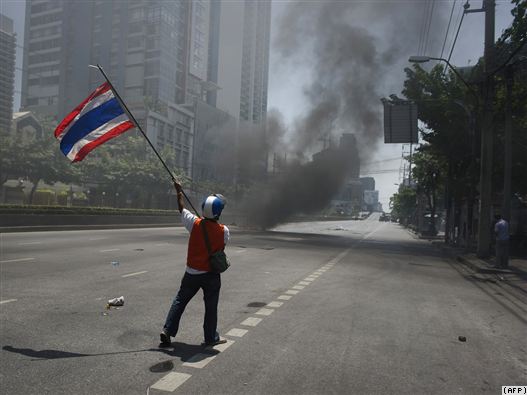
Brilliant piece by Daniel Bell out of Tsinghua U (my favorite Beijing stomping ground) in Japan Times via WPR's Media Roundup (indeed, a great example of what WPR brings to your attention).
I will quote at dangerous length:
Whatever the effects of political turmoil in Thailand, they have not helped the cause of democracy in China. The images of prodemocracy protesters and the subsequent military crackdown in downtown Bangkok have been openly shown in Chinese media without any apparent bias. Indeed, there is no need to embellish the political message for China.
If a relatively well-off and religious country known as the "land of smiles" can so rapidly degenerate into bloody class warfare, what would happen if the Chinese Communist Party lost its monopoly on power?
It is not hard to imagine a Chinese-style red-shirt rebellion, with populist leaders tapping resentment and hotheaded youth torching symbols of privilege in Beijing. If multiparty democracy leads to violent and uncompromising electoral blocs, then most reflective people will prefer one-party rule that ensures social stability.
Still, it would be a mistake for the Chinese government to treat the events in Thailand as an excuse to postpone political reform. The gap between rich and poor is about the same in both countries, and there are tens of thousands of class-based "illegal disturbances" in China every year.
The Chinese government is promoting social welfare in the countryside, but it must also give more institutional expression to social grievances. That requires more representation by farmers and workers in the National People's Congress and subnational legislative organs, more freedom for public-spirited journalists to investigate cases of social injustice, and more freedom for civic organizations to act on behalf of the environment and those who do not benefit from economic reform.
Can China open up without going the way of multiparty rule?
In fact, the great 19th-century British political thinker John Stuart Mill advocated liberal government without multiparty rule ... In Mill's view, an open society ruled mainly by educated elites is the most desirable form of government.
In a similar vein, the Confucian tradition has long emphasized the value of political meritocracy. Confucius himself emphasized that everybody should have an equal opportunity to be educated. But not everybody will emerge with an equal ability to make informed moral and political judgments. Hence, an important task of the political process is to select those with above-average morality and ability. In subsequent Chinese history, the meritocratic ideal was institutionalized by means of the Imperial examination system.
Confucians do not oppose electoral democracy, but they argue that it must be constrained by meritocratically selected political leaders who look after the interests of nonvoters . . .
As it happens, the Chinese Communist Party is becoming more meritocratic. Since the 1980s, an increasing proportion of new cadres have university degrees, and cadres are promoted partly on the basis of examinations. But choosing educated elites is only part of the story.
The elites are also supposed to rule in the interest of all, and to allow for their voices to be heard.
In practice, it means a more open and representative political system, but not necessarily multiparty politics.
Okay, I cut about 200 words.
Just a brilliant piece that shows how China will seek to be different, based on deep local custom, but will invariably have to conform to the demands of its people for more say.
Is the system described here that much different from ours professional political class?
Yes, in the sense that few of them are great minds. But no in the sense that the professional bureaucracy (highly educated and highly ethical, in my experience) runs much of DC.
I think this is how China evolves: increasingly smarter, increasingly competitive, increasing use of polls that simulate voters' preferences (already being done at the top). But I also think China will need, for a stretch (meaning another 20-25 years) the illusion of single-party unity.
My democratic breakthrough for China is a 2030s deal. Can come earlier, but unlikely to go longer. The complexity will grow too great and the people far too competent.
But until such critical masses are reached, expect China to remain as Chinese as possible while submitting to huge and pervasive and magnificent change/stress.
No one wants that place to blow up, because no one will benefit from that pathway.